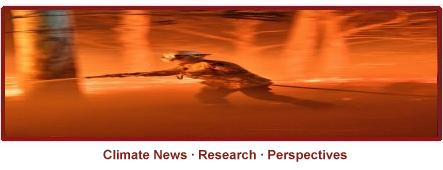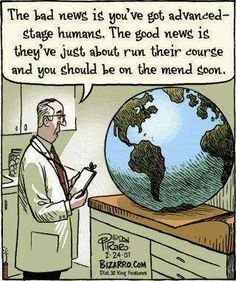
Climate Scenarios
A big-picture overview of where we're likely headed
My original idea for this website was to post a handy well-curated list of notable articles from major peer-reviewed scientific journals, government science research agencies, and mainstream media reporting on such studies, to allow people to read for themselves and draw their own conclusions. That list is the Research page. But in addition some have asked me for my own thoughts on where the climate situation is going. Below is my best guess on that.
Below each scenario is a button. Click it to open a popup window which will display studies, reports, and other references that support this scenario. More references documenting each scenario can be found by searching the Research list for relevant keywords.
As I discuss elsewhere, climate change itself isn't what will get us, I think. That will come later (and won't help). First though, the bare beginnings of it will thoroughly disrupt the fragile house of cards of our globally interconnected economic system, making a mess of this thing we call civilization. Ever play Jenga? Don't have to remove many blocks before the whole thing collapses.
Here are some of the Jenga blocks I'm watching especially closely. There are of course many more issues, and they all seem to be coming to a head these days, faster and faster all the time. To us engineers that's not at all surprising; nature doesn't do linear, nature does exponential.
This page will be updated as new information becomes available. Your suggestions and comments are welcome.
··· --- ···

Consensus is that a 2C temperature rise is disastrous if not Game Over. But there is no way we will not reach 2C and higher. More than half of the greenhouse gases ever generated have been released in the last 30 years, and the release rate is rising because there has pretty much never been a year in which less fossil fuel was burned than the year before. CO2 takes 10+ years to begin causing full damage so all of the effects we see today are the result of gases released some time ago, with plenty more in the pipeline. We are already well more than 1C over baseline, and the greenhouse gases already released will raise planetary temperature by an additional 2-5C and possibly more (total 3-6C) in the very near term. This release rate is virtually guaranteed to continue for at minimum the next 5-10 years due to social inertia, political pushback, and the sheer time to get anything done in this world. So look for more heat.
Heat is energy, and that energy is unevenly distributed in the weather system, and comes out unevenly. Weather happens when energy differentials collide, and more heat means more weather energy. We're already seeing more powerful storms, floods, droughts, hurricanes, etc. As the surges and damage of such weather events collapse infrastructure elements we won't be able to rebuild fast enough. We already can't.
Drought will be everywhere soon, with food-production collapse to follow. Experts project that global fresh water demand will outstrip supply by 40% by 2030. Particularly worrying is the Pakistan/India/China area. The rivers of this region are dwindling. Today they provide water for a billion and a half people, and all those countries have nuclear weapons. Will they use them fighting water wars? Middle east too.
Diseases like Covid-19 are also part of this, and we will see more of them, because they are a direct result of our environmental impingement. Only 20% of ice-free land remains little affected by humans (arguably as low as 3%), and the more that humans push into these wildlands and force animals to interact with us, the more likely that previously-unknown diseases jump from animals to humans. That's how we got AIDS, SARS, Ebola, Lyme disease, and now Covid-19, among others. We have no immunity, and developing medical treatments can take years or decades. So, like Covid-19, there is nothing to stop them.
Fertility rates worldwide are dropping rapidly due to endocrine disruptors - chemicals that look to the body like hormones in our endocrine system, and thus disrupt the body processes those hormones control. These endocrine disruptors are emitted by our plastic waste, pesticides, and many other industrial products, and are everywhere. They can now be found in even the most remote parts of the globe and are in virtually every animal on the planet, including us. Among many other body processes, hormones control the reproductive system, and the rate of reproductive failure is increasing. Sperm counts have dropped almost 60% since 1973, and the trajectory we are on suggests that both male and female fertility could reach zero by 2045 - or possibly sooner. This is an issue for both human and non-human animals, and is likely to cause major issues long before we reach the actual point of zero fertility. Meanwhile, endocrine disruption may also be a culprit in rising rates of autoimmune disorders, the growing epidemic of obesity, and various metabolic syndromes that increase the risk of heart disease, stroke, and diabetes - though of course none of that will matter much if we're all sterile.
The aerosol masking effect (aka 'global dimming') is creating a no-win situation. This is where particulates from industrial air pollution ('aerosols') reflect away some of the sun's heat. They precipitate out quickly but industry keeps generating more, which constantly regenerates the cooling shield. We must stop industrial pollution to have any chance of addressing climate change, but burning less fossil fuel puts up less aerosols, thus lowering the aerosol masking effect as this reflective shield dissipates. And it doesn't matter if the mask goes away because we cleaned up industry, or because of a big economic slowdown, or because of anything else. If the protective mask lessens or stops - for any reason - we'll get a notable jolt of global temperature rise very quickly.
Property and insurance issues. Here are some examples. Much of low-elevation Florida will soon be uninhabitable due to early (ie, relatively minor) sea level rise. Arizona too, because they're last in line for essential Colorado River water, which has been dwindling for a hundred years. Insurance (hedging against risk) is the lubrication that makes our capital-focused civilization possible. But insurers will soon refuse to issue or renew policies in such areas - too risky. We're already seeing this in places like California due to wildfires (see wildfire chart). All lenders and mortgages require active insurance and when owners can't get it property values will collapse. Owners will walk away, leaving those few lenders still exposed stuck with worthless properties. Lenders will also stop making new loans in these areas, making such properties unsellable; that is, worthless. All this property-value failure will quickly create tens of millions of suddenly bankrupt climate refugees. Where will they go and who will take care of them? US citizens have the legal right to go anywhere in US territory. EU, same thing. What effect will millions of destitute climate refugees have on the economies of these areas? We'll see similar worthless-property/destitute-refugee issues in other areas worldwide; these are just a few examples. Also, this will hit not just homeowners but commercial property too, and any other venture where climate change increases risks.
Speaking of refugees, there's the wetbulb situation. Wet bulb temperature is a synthesis of regular temperature and humidity. At over 31 wet-bulb, humans can't sweat away the excess heat, and die within six hours. (The maximum was previously thought to be 35 wetbulb but more recent analysis has updated this limit.) In places like India, Pakistan, Indonesia, and the Middle East we're already close to our first big wetbulb event. The massive death toll will almost immediately generate millions of people looking for anywhere they can go that's cooler. Borders will be ignored. How do you stop millions of desperate people? Governments and systems will collapse over this.
Mammoth wildfires are destroying the world's forests, financially-motivated parties are clearcutting the Amazon, and half of the ocean phytoplankton is already gone. Unfortunately these provide much of the oxygen we breathe. This problem isn't ramping up as quickly as some others, but over time it will definitely be an issue.
The insect apocalypse is already here, and will get worse. Habitat degradation and loss, our petro-agriculture, and other factors are killing insects like mad - up to 80-90% losses. No insects = no pollination = much less food. And insect loss at the base of the food chain means less food for all species up the chain, so they die too. We're seeing this now for example with massive bird dieoffs. Same thing is happening in the ocean with the aquatic food chain.
Methane and Arctic carbon are increasing. As the arctic warms its permafrost is melting, and permafrost contains twice as much carbon as the atmosphere does today, which is quickly converted to more greenhouse gases. This includes methane, which can be up to 200 times more potent than CO2. Imagine an atmosphere with three times the greenhouse gases as now. Won't take an ice-free Arctic ocean to start bringing it out in earnest. Though, we're headed for that too, which won't help.
Then finally, after all that, sea level will rise for real. Most cities are coastal cities and will flood, leaving any coastal residents a) destitute b) homeless and c) heading somewhere else. Also starving and sick. More climate refugees. More political chaos. More collapse.
Can we remove those greenhouse gases from the air that are causing global warming? Sadly, no technology exists to do this that can be deployed at the necessary scale in the time that we've likely got. The most advanced experimental direct air capture facility in the world removes in a year only what humanity emits in a few seconds. And even if we could extract all that carbon, where would we put it? "All of those billions of tons of CO2 are absurdly beyond all of our possible uses of CO2 [and] the global infrastructure to deal with it would be orders of magnitude larger than the entire global oil and gas infrastructure that’s been built over the past 100 years. If we turned it into solids, we’d be burying mountain ranges of carbon, or creating new mountain ranges". Oh, and planting a whole lot of trees? That won't work either.
··· --- ···
So - when will this happen? It depends on what part of "this" you mean, because all facets of "this" will not happen simultaneously worldwide. From the citations above and the thousands more on the Research page it should be clear that it has already begun. If pressed for a number I'd say by about the mid-2020s it will be impossible to deny that we are losing physical and cultural capacity faster than we can rebuild it. There have been examples of this already but what we've seen so far is only a preview of coming attractions.
Earth will be fine. This is just a headcold for a planet. It has been through extinction events
fiveseven times before (that we know of) and will recover soon. Well, soon for a planet. Of course, odds are we'll be long gone by then.
"It is difficult to get a man to understand something, when his salary depends on his not understanding it." (Upton Sinclair)
However, "The good thing about science is that it's true whether or not you believe in it." (Neil deGrasse Tyson)Except where otherwise noted, content on this site is © Barry Smiler and is licensed under
Creative Commons Attribution-NonCommercial 4.0 International (CC BY-NC 4.0)